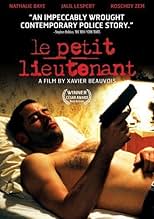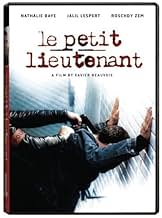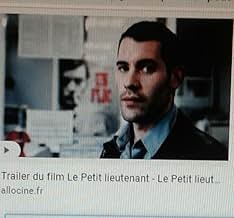VALUTAZIONE IMDb
6,9/10
2691
LA TUA VALUTAZIONE
Aggiungi una trama nella tua linguaA rookie policeman from provincial Le Havre volunteers for the high pressure Parisian homicide bureau and is assigned to a middle-aged woman detective.A rookie policeman from provincial Le Havre volunteers for the high pressure Parisian homicide bureau and is assigned to a middle-aged woman detective.A rookie policeman from provincial Le Havre volunteers for the high pressure Parisian homicide bureau and is assigned to a middle-aged woman detective.
- Regia
- Sceneggiatura
- Star
- Premi
- 5 vittorie e 8 candidature totali
Yaniss Lespert
- Alex Derouère, le frère d'Antoine
- (as Yanis Lespert)
Recensioni in evidenza
Le Petit Lieutenant makes Eastern Promises look like the mediocre knock off it is. "Eastern..." has nothing substantial to offer beyond a couple of signature scenes and is ultimately forgettable after the echo of its posturing and violence subside (can't really understand why the critics adore Cronenberg so much), and it is no more evident than when I compare his film to another that works so much better, like Le Petit Lieutenant (an 8 1/2 out of 10)
Both are dramas that operate fully within the "crime genre," but whereas there is very little that is original or compelling beyond the dramatic pretense of Eastern Promises, the French film is rich with characterizations and direction that lend depth to its realistic story. Whereas "Eastern..." creates slick, hip Hollywood scenes that tease and gratify our primal senses without really engaging any of its real dilemmas, "Petit..." draws us in (via a casual documentary like style) to the life of a young detective just out of cadet school who is becoming familiar with his co-workers and line of work on the streets of Paris. It is through him and his interactions with everything around him that we begin to experience something more dramatic, almost without realizing it, until the tragedy of common (rather than postured) occurrence invades our psyche, and plays out amidst a suspense created by the tension of anxiety, anguish, and inner strength of his chief inspector (a woman), portrayed with great humanity by Nathalie Baye.
Like all Hollywood movies, Eastern Promises offers the semblance of real drama at the beginning, only to abandon its stories and characters as it lapses into the improbability and titillation we have all grown accustomed to at the cinema. The french film, on the other hand, demonstrates its concern for the people it has given life to by engaging our own humanity rather than our anticipation of the next thrill that lies around the corner....
your cinewest correspondent
Both are dramas that operate fully within the "crime genre," but whereas there is very little that is original or compelling beyond the dramatic pretense of Eastern Promises, the French film is rich with characterizations and direction that lend depth to its realistic story. Whereas "Eastern..." creates slick, hip Hollywood scenes that tease and gratify our primal senses without really engaging any of its real dilemmas, "Petit..." draws us in (via a casual documentary like style) to the life of a young detective just out of cadet school who is becoming familiar with his co-workers and line of work on the streets of Paris. It is through him and his interactions with everything around him that we begin to experience something more dramatic, almost without realizing it, until the tragedy of common (rather than postured) occurrence invades our psyche, and plays out amidst a suspense created by the tension of anxiety, anguish, and inner strength of his chief inspector (a woman), portrayed with great humanity by Nathalie Baye.
Like all Hollywood movies, Eastern Promises offers the semblance of real drama at the beginning, only to abandon its stories and characters as it lapses into the improbability and titillation we have all grown accustomed to at the cinema. The french film, on the other hand, demonstrates its concern for the people it has given life to by engaging our own humanity rather than our anticipation of the next thrill that lies around the corner....
your cinewest correspondent
This movie starts out looking like a fairly conventional police procedural and ends up something much richer and subtler. It's full of nice little surprises that subvert our expectations of this sort of movie as we've come to know it from the Hollywood model. In fact, it's a wonderful example of how the American model can be molded into something more complicated. One example of that is the relationship between the "little lieutenant" and his attractive, middle-aged alcoholic supervisor. It's largely a filial-maternal relationship, but with subtle erotic undertones that keep us guessing at what might (or might not) develop between the two characters. In fact, little about the plot or the characters turn out the way you expect, and that's a fine thing. The movie also has a script written with exceptional skill and economy. We see only one scene between the lieutenant and his wife, and we hear a few additional comments about his marriage in other scenes, but from these brief bits we get a picture of a complex and problematic relationship that tells us as much as we need to know about the couple. While nothing about this movie is flashy, I haven't been able to get it out of my mind since I saw it earlier this week. It's thought provoking and I recommend it highly.
This is less about the crime, then the day to day minutiae of police work, in particular the growing relationship between an eager young lieutenant, and his tough, ex-alcoholic boss – Nathalie Baye, in an excellent, uncharacteristically dark performance. There's no romance between the two, just an evolving connection.
In the meantime, the lieutenant's home life is a mess – his wife is understandably angry because he requested his Paris posting, far from their home and her work, without asking her.
This sad, low key, almost documentary like film, without music or fancy shots, is an insightful look into the people who face crime every day. Dense enough that I'd gladly re-see it.
In the meantime, the lieutenant's home life is a mess – his wife is understandably angry because he requested his Paris posting, far from their home and her work, without asking her.
This sad, low key, almost documentary like film, without music or fancy shots, is an insightful look into the people who face crime every day. Dense enough that I'd gladly re-see it.
A young tough guy, eager to be a real cop solving real crime, and to be really cool. A middle-aged woman, alone, with personal problems but well organized and effective. Put these two together in a big city ("the jungle") in some cheesy office rooms, and you may expect to see another cliché cop-movie. But you're wrong.
First of all, this film contains not much action at all. The murder that things evolve around is not the main attraction, it is more of a catalyst for the development of the humans on screen. Furthermore, there is no music to "guide" us emotionally, and no extreme display of emotions (or overacting) as is so common. Instead we follow the characters at distance, but emotions are there, but like in real life, poorly articulated and often ambiguous. And the less glamorous work of attending an autopsy, and reactions to it, is also shown; just the sound is disgusting, and that scene of the film has for me a really artistic feeling to it: it highlights the "fleshy-ness" of the body, that it is not just an abstract piece in life, but something bulky, ugly, imperfect and vulnerable, which is quite a contrast to how the young tough guy probably considers himself.
These aspects together means that the film is more real. That does not have to be an advantage for a film - good film rarely limit itself to a display of reality. But to follow the development of the characters, their life and work, from a distance, sometimes with some police action added, as you do in a very precise way in this film, is very rewarding. This is a good drama with action content.
First of all, this film contains not much action at all. The murder that things evolve around is not the main attraction, it is more of a catalyst for the development of the humans on screen. Furthermore, there is no music to "guide" us emotionally, and no extreme display of emotions (or overacting) as is so common. Instead we follow the characters at distance, but emotions are there, but like in real life, poorly articulated and often ambiguous. And the less glamorous work of attending an autopsy, and reactions to it, is also shown; just the sound is disgusting, and that scene of the film has for me a really artistic feeling to it: it highlights the "fleshy-ness" of the body, that it is not just an abstract piece in life, but something bulky, ugly, imperfect and vulnerable, which is quite a contrast to how the young tough guy probably considers himself.
These aspects together means that the film is more real. That does not have to be an advantage for a film - good film rarely limit itself to a display of reality. But to follow the development of the characters, their life and work, from a distance, sometimes with some police action added, as you do in a very precise way in this film, is very rewarding. This is a good drama with action content.
Extremely realistic. So much so that it's almost miserable to watch. We see a young and inexperienced police detective adjust to the aspects of his new job - from working through a pistol stoppage on the range, to knocking on doors looking for information about a murder, interviewing people who barely speak his language and trying to integrate with his new coworkers. We also see an experienced police veteran working through the problems that prolonged living in a stressful environment have produced as she returns to work after a two-year sabbatical. She takes the young Antoine with her throughout the course of a murder investigation, and the illustration of the dichotomy between them is nearly perfect. Avoided are the cliché kicking down of doors, Miami Vice / Hawaii 5-0-style firefights, Joe Friday detectives and "arch villains" that typically plague police films. The overall feeling that I had throughout the movie was monotony and despair as I identified with Antoine's feelings of separation, anxiety and of being overwhelmed. We see equally Commandant Vaudieu's sobriety struggle in scenes where her section is gathering at a bar after work for drinks while she orders a glass of mineral water. It's not a happy movie, it's not even entertaining, but it is realistic, extremely well played, and it is a moving, gritty drama that does for PJs what La Chambre des Officiers did for soldiers. It humanises them.
Lo sapevi?
- QuizXavier Beauvois, the director, decided finally not to use background music for this movie. It gives a special atmosphere to the movie.
- BlooperReflected in window as Vaudieu and Solo exit the church.
- Citazioni
Mireille, la logeuse: [after Antoine introduces himself as Lieutenant Derouère] These days, it's "Lieutenant" and "Captain." It's too much like the Army. Not that I don't like the Army, but "Monsieur l'Inspecteur"... It makes me think of Maigret...
- ConnessioniReferenced in Le Mozart des pickpockets (2006)
I più visti
Accedi per valutare e creare un elenco di titoli salvati per ottenere consigli personalizzati
Dettagli
- Data di uscita
- Paese di origine
- Sito ufficiale
- Lingue
- Celebre anche come
- The Young Lieutenant
- Luoghi delle riprese
- 118 Rue des Pyrénées, Paris 20, Parigi, Francia(shelter where Antoine gets stabbed)
- Aziende produttrici
- Vedi altri crediti dell’azienda su IMDbPro
Botteghino
- Lordo Stati Uniti e Canada
- 216.724 USD
- Fine settimana di apertura Stati Uniti e Canada
- 16.871 USD
- 10 set 2006
- Lordo in tutto il mondo
- 3.984.265 USD
- Tempo di esecuzione
- 1h 50min(110 min)
- Colore
- Mix di suoni
- Proporzioni
- 1.85 : 1
Contribuisci a questa pagina
Suggerisci una modifica o aggiungi i contenuti mancanti

![Guarda Bande-annonce [OV]](https://m.media-amazon.com/images/M/MV5BZTQ1NDYxZTYtMGRjZC00YTkwLTkxZTktODMzNjk1NjU0MWExXkEyXkFqcGdeQXRyYW5zY29kZS13b3JrZmxvdw@@._V1_QL75_UX500_CR0)
















